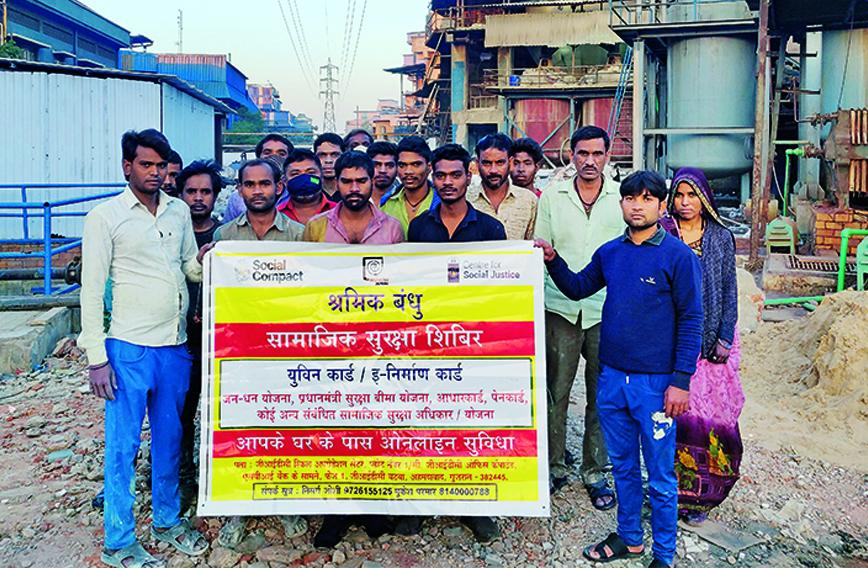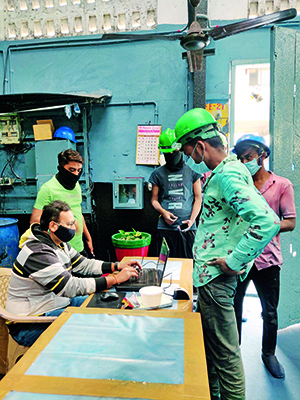
Workers at a safety meet
Companies pledge better worker rights
Civil Society News, New Delhi
WHEN the sorry plight of industrial workers was in everyone’s face during the Covid-19 pandemic lockdown, some public-spirited companies of the Pune belt came together to form the Social Compact.
These companies felt it wasn’t enough to merely provide assistance to workers amid the upheaval of the lockdown, but to address the deeper reasons for their plight.
It was important for employers to publicly pledge to implement at least the prevailing laws governing workers’ rights and benefits. Most big companies would be legally compliant, but perhaps their supply chains weren’t. And merely being compliant was not enough, it was important to go further so that a more just and equitable system could emerge.
At another level, managements needed to do much soul-searching and take the path to internal reform so that workers, in addition to their rights, were seen as co-creators of a company’s wealth. The Social Compact would be a medium for achieving such systemic change as well.
Three years after it was formed is perhaps a good time to revisit the Social Compact to see how it has fared. The first-movers set out to raise the bar for industry as a whole. But how many other companies have found merit in the initiative? For an economy-wide transformation, sufficient buy-ins are needed.
Unlike corporate social responsibility (CSR), the Social Compact goes to the core of business practices. It encourages managements to reorient themselves to include workers in decision-making and recognize that they have capacities and social and economic aspirations that go beyond the terms of employment. It calls for affirmative action and inclusive policies.
The goal was to enrol 100 companies. We learn that 60 are in — a mix of medium and large companies. The majority of them, however, have a long way to go. If a basic wage is being paid, a living wage is not. Women are being hired but in insufficient numbers. Affirmative action is the key to inclusive workplaces yet most companies aren’t formally pledged to it. Gender-sensitive facilities and women-friendly employment terms like maternity leave are lacking. The list goes on.
The Social Compact was created with the involvement of the Aajeevika Bureau, the Centre for Social Justice and Dasra — all voluntary organizations engaged in helping workers in the unorganized sector assert their rights in dealings with employers.
Since then, the Aajeevika Bureau has conceived and incubated the Work Fair and Free Foundation which engages with companies that join the Social Compact.
 Divya Varma is co-founder and director, knowledge and policy, of the foundation. Nisarg Joshi is an associate working directly with Social Compact companies.
Divya Varma is co-founder and director, knowledge and policy, of the foundation. Nisarg Joshi is an associate working directly with Social Compact companies.
“In the past three years we have reached 60-plus companies and their supply chains pan-India. And the kind of recommendations that we have been pursuing with these companies have kind of, you know, triggered changes or had an impact on 55,000 workers,” says Joshi. “And if you look at the overall size of the recommendations that we have made for the 60-plus companies, it would roughly cover about 300,000 workers pan-India.”
 Asked what pan-India exactly means, Joshi explains: “Companies have multi-locational sites and their supply chains are spread across the length and breadth of the country. Major companies in the manufacturing and construction sector who have joined us recently are working throughout India.”
Asked what pan-India exactly means, Joshi explains: “Companies have multi-locational sites and their supply chains are spread across the length and breadth of the country. Major companies in the manufacturing and construction sector who have joined us recently are working throughout India.”
“We’ll be doing site assessments for them at these different locations and then will also try and go deeper into their supply chains as well,” he adds.
NON-DISCLOSURE
But the new managements coming in, it appears, are cautious in how they proceed under the Social Compact and prefer to feel their way through unfamiliar terrain.
A majority of companies has had the Work Fair and Free Foundation sign non-disclosure agreements, which means they can’t be named nor can their involvement with the Social Compact be discussed in the public domain.
This calibrated approach appears to be in sharp contrast to the passion with which the Social Compact was conceived and launched by already socially engaged companies like Thermax, Forbes Marshall, Bajaj Auto and Godrej.
The initial impetus came from these companies and it was the peer pressure they applied that in the beginning brought in other companies, explains Varma.
Now companies come on board because of the value they see in their association with the Social Compact. Many of them have to come to terms with social compliances. They also deal globally and worry about their image in relation to gender equality, fair wages and inclusive workplaces.
Says Varma: “It is a combination of things. At the start, I think the basic reason companies came was that a lot of these invitations were triggered by the existing champions and they are all part of, you know, one community of industrialists. This kind of peer pressure continues to act on the bigger companies that have newly joined. So that is one reason.”
 |
|
At a worker facilitation centre run by the Aajeevika Bureau |
“But the second, bigger, reason, I would say, is that they are competing globally, where ESG or Environment, Social and Governance frameworks are now in place,” Varma explains. “The ‘S’ in that is something that many of them are looking for. Environmental mandates are clear, but ‘social’ is what a lot of them are grappling with. So, we are really pitching Social Compact as a channel which will allow companies to comply with the ESG mandate.”
“It is true that the first-movers were Pune-based companies and a lot of them were Parsi family-owned companies. But now I think we’ve moved beyond that ambit to cover more publicly-owned companies. Some are also multinationals,” says Varma.
“There are four or five big names that are publicly listed,” adds Joshi. “But nearly 60 percent of the companies are not publicly listed and are medium-scale companies.”
NEW MINDSETS
With the change in the composition of companies, has the emphasis shifted to regulation?
“No, I am not saying it’s regulation-driven. I am saying this one factor helps us pitch to these companies,” explains Varma. “We find a lot of second-generation leaders in these businesses who have global exposure and understand that business has to be responsible.”
“It is to this mindset that we are appealing. Even in non-family owned and management-driven companies the managers come from leading business schools where some of the social consciousness is coming in,” she adds.
Social Compact addresses the needs of companies based on their immediate priorities and the systemic changes they could make.
“We focus on six main outcomes that range from wages and safety, access to entitlements, future of work, and then a gender lens is attached to all these outcomes as well,” says Varma.
“The company will first assess itself based on these six outcomes. We then conduct a site visit and show them what it is actually like on the shopfloor,” she says.
Recommendations follow together with help in framing an action plan for their implementation within the company and in its supply chain.
“We have broadly seen a lot of companies implementing these recommendations based on what their priority is at the moment. And then they also need some sort of support to actually bring in systemic changes.”
In the long run, the Social Compact is directed at a major transformation in how companies respond to worker needs. It is not easy and change has to come incrementally given the choices managements have to make. The important thing is that a process is in place and is already beginning to be effective.
Comments
-

Lekha - Aug. 9, 2023, 3:56 p.m.
Good information, new mindsets will help



